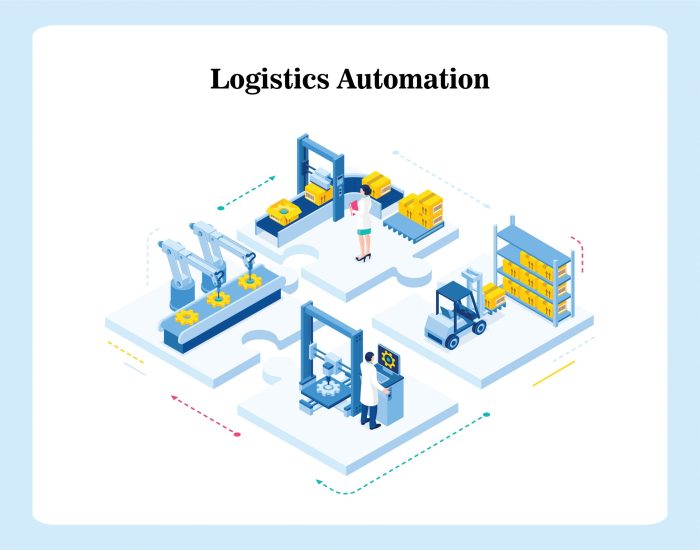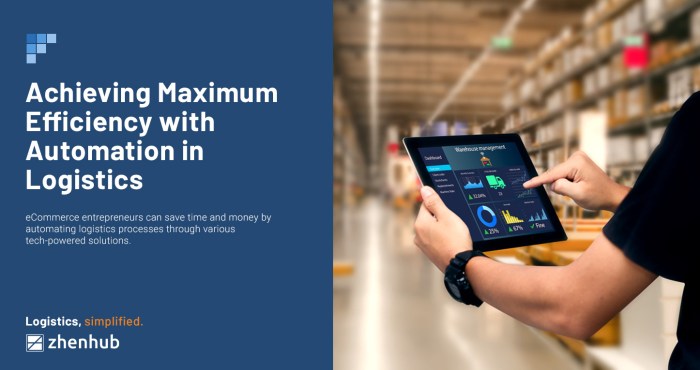
Step into the world of automated logistics systems, where efficiency meets innovation, and supply chains are optimized to perfection. Get ready for a journey filled with insights and discoveries!
In today’s fast-paced world, businesses are constantly seeking ways to improve their operations. Automated logistics systems offer a solution that revolutionizes the transportation industry, providing a competitive edge to those who embrace it.
Automated Logistics Systems
Automated logistics systems in the transportation industry involve the use of technology to streamline and optimize the movement of goods from one point to another. These systems rely on automation, artificial intelligence, and data analytics to manage and coordinate various processes within the supply chain.
Benefits of Implementing Automated Logistics Systems
Automated logistics systems offer numerous advantages to businesses, including increased efficiency, reduced operational costs, improved accuracy, and enhanced visibility and control over the supply chain. By automating tasks such as order processing, inventory management, and route optimization, companies can save time and resources while improving overall performance.
- Enhanced Efficiency: Automated systems can perform repetitive tasks quickly and accurately, allowing for faster order fulfillment and delivery times.
- Cost Savings: By optimizing processes and reducing errors, businesses can lower their operational expenses and improve their bottom line.
- Improved Accuracy: Automation helps minimize human error, leading to greater precision in inventory management and order processing.
- Enhanced Visibility: Real-time tracking and monitoring capabilities provided by automated systems enable businesses to have better visibility into their supply chain operations.
Technologies Used in Automated Logistics Systems
Automated logistics systems leverage a variety of technologies to enhance supply chain management. These technologies include:
RFID (Radio Frequency Identification): RFID tags are used to track and identify products throughout the supply chain, improving inventory accuracy and visibility.
Warehouse Management Systems (WMS): WMS software helps optimize warehouse operations by managing inventory, picking, packing, and shipping processes efficiently.
Transportation Management Systems (TMS): TMS solutions enable businesses to plan, execute, and optimize transportation operations, leading to cost savings and improved delivery performance.
Artificial Intelligence (AI) and Machine Learning: AI-powered algorithms analyze data to predict demand, optimize routes, and improve decision-making in supply chain management.
Textiles and Nonwovens

Textiles and nonwovens play a crucial role in the transportation and logistics sector, providing essential materials for packaging, protecting goods, and ensuring efficiency in supply chain operations.
Material Composition
Textiles are typically made from natural or synthetic fibers that are woven or knitted together to form a fabric. Nonwovens, on the other hand, are made by bonding fibers together through mechanical, chemical, or thermal processes without the need for weaving or knitting.
Applications in Transportation and Logistics
- Textiles are commonly used in the manufacturing of bags, covers, and straps for securing and transporting goods.
- Nonwovens are often utilized in the production of protective packaging materials, such as bubble wrap, foam padding, and cushioning inserts.
- Both textiles and nonwovens are essential for creating durable and flexible packaging solutions that can withstand the rigors of transportation and storage.
Role in Packaging and Protection
- Textiles provide strength and durability to packaging materials, ensuring that goods remain intact during handling and transit.
- Nonwovens offer cushioning and shock-absorption properties, protecting fragile items from damage or breakage.
- Together, textiles and nonwovens help maintain the integrity of goods throughout the supply chain, reducing the risk of losses or disruptions.
Advancements in Sustainability
- Recent advancements in textiles and nonwovens have led to the development of eco-friendly materials made from recycled fibers or biodegradable polymers.
- These sustainable alternatives help reduce the environmental impact of packaging waste and promote circular economy practices in logistics operations.
- By incorporating recycled or biodegradable materials, companies can enhance their sustainability efforts and contribute to a greener, more efficient supply chain.
Business Creation and Development
Incorporating automated logistics systems into a new business venture can be a game-changer in terms of efficiency and cost-effectiveness. By leveraging technology to streamline processes, businesses can enhance their operations and stay competitive in the market.
Strategies for Incorporating Automated Logistics Systems
- Conduct a thorough analysis of your business needs and processes to identify areas where automation can be most beneficial.
- Invest in reliable automated logistics software and hardware that align with your specific business requirements.
- Provide adequate training to your staff to ensure smooth implementation and utilization of the automated systems.
- Collaborate with experienced professionals or consultants to help integrate automated logistics solutions seamlessly into your business.
Challenges Faced by Startups in Developing Automated Logistics Solutions
- High initial investment costs can be a significant barrier for startups looking to implement automated logistics systems.
- Finding skilled personnel with expertise in automated logistics technology can be challenging for startups.
- Integration issues with existing systems and processes may arise, leading to disruptions in operations.
- Scaling up automated logistics solutions as the business grows can pose logistical and financial challenges for startups.
Opportunities for Growth and Expansion Through Automated Logistics Technologies
- Increased efficiency and accuracy in operations can lead to cost savings and improved customer satisfaction, driving business growth.
- Real-time tracking and data analytics provided by automated logistics systems can enable better decision-making and strategic planning.
- Automation allows businesses to handle larger volumes of orders and shipments, expanding their reach and market presence.
Examples of Successful Businesses Leveraging Automated Logistics
- Amazon: Utilizes advanced robotics and AI-powered systems in its fulfillment centers to optimize order processing and delivery.
- Zara: Implements automated inventory management systems to ensure efficient supply chain operations and timely product replenishment.
- UPS: Incorporates automated sorting and routing technologies to streamline package handling and distribution processes.
Domestic Services

Automated logistics systems play a crucial role in enhancing domestic transportation services by optimizing routes, reducing delivery times, and increasing overall efficiency in supply chain operations.
Improved Last-Mile Delivery and Customer Satisfaction
Automated systems have revolutionized last-mile delivery by utilizing advanced technology such as drones and autonomous vehicles to ensure faster and more reliable delivery to customers. This streamlined approach not only reduces delivery times but also enhances customer satisfaction by providing real-time tracking and delivery updates.
Streamlining Domestic Supply Chain Operations
Automation in domestic supply chain operations helps in improving inventory management, order processing, and warehouse operations. By automating these processes, companies can reduce human error, minimize costs, and increase overall productivity in the supply chain.
Companies Excelling in Domestic Logistics Services through Automation
Amazon
Known for its advanced logistics network and utilization of robotics and AI in warehouse operations.
UPS
Implements automated sorting systems and route optimization algorithms for efficient domestic deliveries.
FedEx
Utilizes automated technologies for package tracking, sorting, and delivery to enhance customer experience.
Translation Services
In the global logistics industry, translation services play a crucial role in ensuring smooth communication and operations across international borders. These services are essential for facilitating effective communication in international supply chains and overcoming language barriers that can hinder the efficiency of logistics processes.
Importance of Translation Services in Logistics
- Translation services help in translating important documents, such as contracts, shipping information, and customs documents, to ensure accuracy and compliance with regulations.
- They enable real-time communication between different parties involved in the logistics chain, such as suppliers, manufacturers, carriers, and customers, leading to better coordination and decision-making.
- By breaking down language barriers, translation services help in building strong relationships with international partners and expanding business opportunities in global markets.
Challenges of Language Barriers in Logistics and Role of Translation Technology
- Language barriers can lead to misunderstandings, delays, and errors in logistics operations, affecting the overall efficiency and profitability of businesses.
- Translation technology, such as machine translation and localization software, can help in translating large volumes of data quickly and accurately, improving the speed and accuracy of communication in logistics.
- However, challenges like cultural nuances, technical terminology, and context-specific language usage still pose obstacles that require human translators for accurate and nuanced translations.
Successful Implementations of Translation Services in Logistics Operations
- Companies like DHL, FedEx, and UPS have successfully integrated translation services into their logistics operations to enhance communication with global partners and customers.
- Using a combination of human translators and advanced translation technology, these companies ensure seamless communication across different languages and regions, improving customer satisfaction and operational efficiency.
- By investing in translation services, logistics companies can gain a competitive edge in the global market, expand their reach, and establish strong relationships with international stakeholders.
Last Point
From optimizing supply chain management to enhancing customer satisfaction, automated logistics systems are the future of efficient transportation. Embrace the power of automation and watch your business soar to new heights!
FAQs
How do automated logistics systems benefit businesses?
Automated logistics systems streamline operations, reduce costs, and improve efficiency, ultimately leading to increased profitability.
What technologies are used in automated logistics systems?
Technologies such as RFID, AI, and robotics play a crucial role in optimizing operations and enhancing overall efficiency.
Can startups benefit from incorporating automated logistics systems?
Absolutely! Startups can leverage automated logistics systems to scale their operations, reduce manual errors, and stay competitive in the market.





